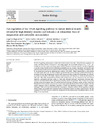Please use this identifier to cite or link to this item:
https://accedacris.ulpgc.es/jspui/handle/10553/119283
| Title: | Fast regulation of the NF-kappa B signalling pathway in human skeletal muscle revealed by high-intensity exercise and ischaemia at exhaustion: Role of oxygenation and metabolite accumulation | Authors: | Gallego Sellés, Angel Galván Álvarez, Víctor Martinez Canton, Miriam García González, Eduardo Morales Álamo, David Santana Rodríguez, Alfredo González Henríquez, Juan José Dorado García, Cecilia López Calbet, José Antonio Martín Rincón, Marcos |
UNESCO Clasification: | 32 Ciencias médicas 2302 Bioquímica 2411 Fisiología humana |
Keywords: | Fatigue ROS NF kappa B Performance Free radicals, et al |
Issue Date: | 2022 | Project: | Desarrolloy Caracterización Molecular de Un Nuevo Modelo de Precondicionamiento Remoto Identificacion E Integracion de Nuevos Factores Moleculares, Fisiologicosy Bioelectricos Determinantes Del Rendimiento en El Ejercicio de Sprint Regulación de la oxidación de ácidos grasos durante la recuperación de ejercicios extenuantes. El papel de la FiO2 y los Radicales Libres Estudio longitudinal de los efectos de una modificación intensiva del estilo de vida en la composición corporal e indicadores bioquímicos y moleculares de salud en pacientes con sobrepeso y obesidad: aplicación para la evaluación fisiológica de rutas y sistemas de monitorización del esfuerzo ... |
Journal: | Redox Biology | Abstract: | The NF-κB signalling pathway plays a critical role in inflammation, immunity, cell proliferation, apoptosis, and muscle metabolism. NF-κB is activated by extracellular signals and intracellular changes in Ca2+, Pi, H+, metabolites and reactive oxygen and nitrogen species (RONS). However, it remains unknown how NF-κB signalling is activated during exercise and how metabolite accumulation and PO2 influence this process. Eleven active men performed incremental exercise to exhaustion (IE) in normoxia and hypoxia (PIO2:73 mmHg). Immediately after IE, the circulation of one leg was instantaneously occluded (300 mmHg). Muscle biopsies from m. vastus lateralis were taken before (Pre), and 10s (Post, occluded leg) and 60s after exercise from the occluded (Oc1m) and free circulation (FC1m) legs simultaneously together with femoral vein blood samples. NF-κB signalling was activated by exercise to exhaustion, with similar responses in normoxia and acute hypoxia, as reflected by the increase of p105, p50, IKKα, IκBβ and glutathione reductase (GR) protein levels, and the activation of the main kinases implicated, particularly IKKα and CaMKII δD, while IKKβ remained unchanged. Postexercise ischaemia maintained and stimulated further NF-κB signalling by impeding muscle reoxygenation. These changes were quickly reverted at the end of exercise when the muscles recovered with open circulation. Finally, we have shown that Thioredoxin 1 (Trx1) protein expression was reduced immediately after IE and after 1 min of occlusion while the protein expression levels of glutathione peroxidase 1 (Gpx1) and thioredoxin reductase 1 (TrxR1) remained unchanged. These novel data demonstrate that exercising to exhaustion activates NF-κB signalling in human skeletal muscle and regulates the expression levels of antioxidant enzymes in human skeletal muscle. The fast regulation of NF-κB at exercise cessation has implications for the interpretation of published studies and the design of new experiments. | URI: | https://accedacris.ulpgc.es/handle/10553/119283 | ISSN: | 2213-2317 | DOI: | 10.1016/j.redox.2022.102398 | Source: | Redox Biology [ISSN 2213-2317], v. 55, 102398 (Septiembre 2022) |
| Appears in Collections: | Artículos Artículos |
SCOPUSTM
Citations
22
checked on Jun 8, 2025
WEB OF SCIENCETM
Citations
26
checked on Jan 25, 2026
Page view(s)
41
checked on Jan 11, 2026
Download(s)
6
checked on Jan 11, 2026
Google ScholarTM
Check
Altmetric
Share
Export metadata
Items in accedaCRIS are protected by copyright, with all rights reserved, unless otherwise indicated.
